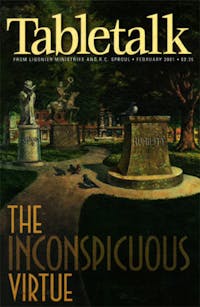
Request your free, three-month trial to Tabletalk magazine. You’ll receive the print issue monthly and gain immediate digital access to decades of archives. This trial is risk-free. No credit card required.
Try Tabletalk NowAlready receive Tabletalk magazine every month?
Verify your email address to gain unlimited access.
In 1976, Francis Schaeffer published a hard-hitting book titled How Should We Then Live? To a certain degree, The Micah Mandate by George Grant is an attempt to answer Schaeffer’s question. The mandate Grant refers to in the book’s title is based upon Micah 6:8, which reads, “He has shown you, O man, what is good; and what does the LORD require of you but to do justly, to love mercy, and to walk humbly with your God?”
Structuring the book around this threefold mandate, Grant delves into the meaning of justice, mercy, and humility. He notes that believers too often view the Christian life as an either/or choice between activism and pietism when the reality is both/and.
Readers are offered fascinating insights into the lives of Christians throughout the ages who have exemplified the proper balance between activism and pietism. Grant explains that, “Whenever and wherever the Gospel has gone out, the faithful have emphasized the priority of good works, especially works of compassion toward the needy.” From Basil of Caesarea, who established “the world’s first nonambulatory-care hospitals,” to Corrie ten Boom, whose family helped save Jews from the Nazis, Christians have been called to be “living symbols of God’s justice, mercy, and compassion.”
Grant, the president of the King’s Meadow Study Center in Franklin, Tenn., warns American evangelicals that the greatest threat to America is not the ACLU, Planned Parenthood, or the violence on television—the greatest threat is a Christian church without a concern for justice, mercy, or humility. In a culture saturated with self-improvement and self-sufficiency, Christians are called to care for others—to minister to those who have hit bottom. They are called to feed the hungry, to visit orphans and widows, and to have compassion for all who are in need.
Grant notes, “Unbelievers can argue theology. They can dispute philosophy. They can subvert history. And they can undermine character. But they are helpless in the face of extraordinary feats of selfless compassion.”
Those churches that stand within the Reformed tradition must take special care not to forget this fact. Ours is a tradition that has excelled in theology and philosophy. Many of the greatest theological minds in the history of the church have claimed the Reformed faith as their own. But if our theology causes us to forget the needs of the helpless as we dispute and discuss the finer points of doctrine, then our theology has become for us mere words and a stumbling block to a world of lost sinners. Our minds are not renewed by a hardening of our hearts.
The church is called to proclaim good doctrine and to practice good works. As Grant so eloquently observes, “The Gospel calls us to live daily as if people really matter.”
The Micah Mandate is published by Cumberland House.
